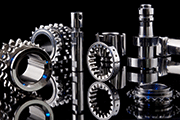E-Archive
Good Vibrations
in Vol. 19 - January Issue - Year 2018
Professional Mass Finishing Engineer

Objects for surface finishing training

Surface finishing training practical foundations

Workshop surface finishing theoretical foundations
Which are the main topics when you qualify as a mass finishing engineer?
The lack of an accredited vocational training course for mass finishing engineers at technical schools and advanced technical colleges has been a problem for the mass finishing industry for many years. Even though the technology has entered all areas of the metal and plastics processing industry in the past 20 years, no specific training is available.
And so it is the responsibility of companies to provide professional training. The problem is that training content and intensity vary considerably and there are no overall training standards. There is some specialist literature, but it is very technical and theoretical and therefore of limited use for training purposes.
This column provides a concise overview of the main topics and can serve as a professional training guide. The application engineers and trainers of the well-known industry specialists provide a more in-depth understanding of the specific subject areas.
• Metal expertise
A basic knowledge of metals and plastics and their properties is essential and constitutes the basic qualification. This includes knowing which metals and plastics are available, how they are processed and what their areas of application are. To gain a realistic understanding of the possibilities and limits of processes and the resulting products, it is important to have knowledge of the properties of metals (and their alloys) and plastics.
• Grinding, polishing, deburring and cleaning processes
It is important to have a comprehensive overview of the many available grinding, polishing and deburring processes and the differences between them.
Which process is suitable for which requirement? What are the pros and cons of the processes and what are the key areas of application?
• Systems technology for grinding, polishing, deburring and cleaning
Which systems technology is available for grinding, polishing, deburring and cleaning? Which systems are used for which applications and what are the limits of the individual systems? Which equipment options are available, which equipment is necessary, which useful and which of advantage? What automation options are there for the different systems?
• Process agents/consumables for grinding, polishing, deburring and cleaning
There exists a vast number of different agents/consumables for grinding, polishing, deburring and cleaning. Which process agents are used for which applications and what are the advantages and limits of the individual agents.
Mechanical as well as chemical products are used in mass finishing; therefore, in order to understand and influence the processes, the relationships between mechanical and chemical modes of action have to be taught. A mass finishing engineer has to have a thorough understanding of these things to be able to establish stable and reproducible processes in a company.
• Peripheral devices
In addition to the main production machinery, a variety of peripheral devices are available for industry, which are used to extend the machining task itself or to improve or automate handling and processes. These include transport systems (e.g. feeders and conveyor belts), drying systems, separating devices, process water treatment systems (wastewater treatment plants), automation equipment (e.g. robots). A planning engineer should have extensive knowledge of the available systems in order to decide what is required and useful for his production environment. Only then will he be able to optimally configure the individual components and thus develop a strong overall concept.
Serious planning errors can result in unstable processes, inefficient production runs and economic inefficiency.
• Upstream and downstream processes
In order to be able to plan and execute mass finishing operations, it is of benefit to know and understand the original manufacturing operation. The manufacturing operation tells you what the properties of the workpiece surface and the workpiece edges are.
To be able to deliver a perfectly prepared surface for the subsequent process (e.g. electroplating), it makes sense to know what the main criteria of the downstream processes are.
This may include workpiece cleanliness requirements or a definition of the workpiece edges.
• Assessing surface finish and quality assurance
An essential part of quality assurance after a mass finishing process is the assessment of the surface properties. This may be about defining roughness, or measuring surface tension or edge roundness. Here, standards or specific specifications might have to be met and the processing results have to be tested. Most companies have their own measuring equipment to do this, and sometimes measurements and tests are carried out by accredited external laboratories. Over the course of his training, the mass finishing engineer should acquire the basic knowledge necessary to be able to assess the practical results from the production processes and the measurement results.
These days, every industrial company has to have an effective quality management system in place. The surface finish is critical for quality, and in most cases, the mass finishing engineer is directly or indirectly involved in the quality assurance of his production area. It is therefore a key element of this demanding profession to keep an eye on all the standard quality assurance measures (stability, documentation, reproducibility, traceability).
A well-qualified mass finishing engineer can perform many roles within a company. Production, development, process planning and quality assurance departments are always looking for qualified staff who have the right training or are prepared to undergo such training. To meet the growing demand, major specialist companies, such as Rösler Oberflächentechnik GmbH (https://de.rosler.com/de-de/service/roesler-academy/) also offer specialist training courses and workshops.
Good Vibrations
by Dirk Gather, Contributing Editor MFN and Managing Director of surfaced GmbH, Germany
Tel. +49.3301.5232.0
Fax +49.3301.5232.29
E-mail: dirk@mfn.li



























